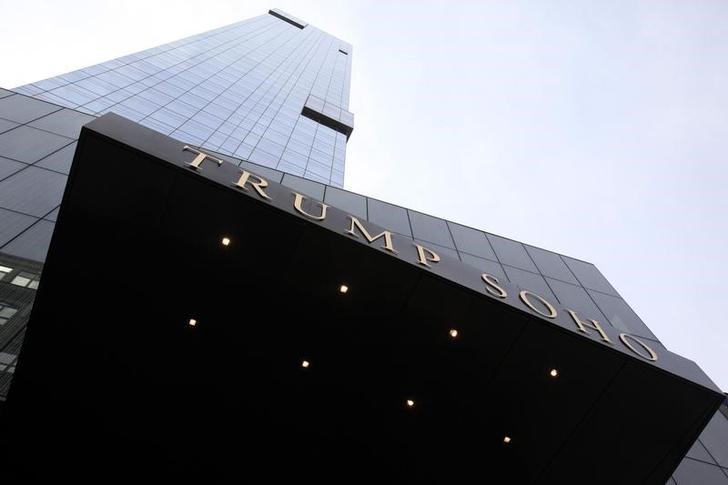Investing.com’s stocks of the week
By Julia Harte
WASHINGTON (Reuters) - U.S. President Donald Trump is flirting with unparalleled violations of the Constitution by not divesting himself from a hotel management company that benefits financially from public pension fund investments, according to two Democratic U.S. senators.
Reuters exclusively reported on April 26 that public pension funds in at least seven U.S. states periodically send millions of dollars to an investment fund that owns the Trump SoHo Hotel and Condominium in New York City and pays one of Trump's companies to run it, according to a Reuters review of public records.
The investments could put Trump at risk of violating an obscure constitutional clause that prohibits the president from receiving additional payments beyond his salary from state governments, say several constitutional lawyers. A separate constitutional clause bars the president from receiving payments from foreign governments.
Trump is “setting an extremely dangerous precedent,” said Ben Cardin, the top Democrat on the Senate Foreign Relations Committee, on Friday. Senator Richard Blumenthal of Connecticut expressed similar concerns.
The White House and the Trump Organization did not respond to calls and emails asking for comment.
At a January news conference where Trump said he would turn over management of his companies to a trust controlled by his two elder sons, his lawyer, Sheri Dillon, announced that he would donate all profits from foreign government payments made to his hotel to the U.S. Treasury. Dillon said Trump was taking this step even though the Constitution did not require it.
Trump still earns revenue from the hotel management company and the other businesses in the Trump Organization. Reuters asked five Republican lawmakers to comment on the public investments in the owner of the Trump-operated hotel, but none responded.
Cardin introduced a resolution in March calling on Trump to convert his assets to "conflict-free holdings," turn over control of his businesses to trustees with no relationship to him, or take some other measure to avoid violating the Constitution.
That resolution focused on payments from foreign governments, but Cardin said the flow of public U.S. money to Trump from pension funds was also “disturbing” and “reduced confidence that President Trump is acting in the public interest.”
Blumenthal, who is leading efforts among Senate Democrats to hold Trump accountable for payments he receives from foreign and domestic governments, said the public pension fund investments are “near the top, if not at the top” of the potential domestic violations he knows about.
Blumenthal added that Trump could “easily cure” the problem by divesting. Dillon said at the January conference that if Trump sold his brand he would still be entitled to royalties for its use, and so divesting would "exacerbate" potential conflicts of interest.
The Trump SoHo is owned by a Los Angeles investment group, the CIM Group, through one of its real estate funds. State- and city-run pension funds that have invested in the CIM fund pay it a few million dollars in quarterly fees to manage investments in its portfolio, which includes the Trump SoHo, according to state investment records.
In return for marketing and managing the hotel-condo, CIM pays Trump International Hotels Management LLC 5.75 percent of the SoHo's operating revenues annually.
One of the public pension fund managers that invested in the owner of the Trump SoHo, the Montana Board of Investments, said Trump should answer any constitutional concerns about the investments.
Since the public pension funds made the investments a decade ago, “Mr. Trump’s circumstances obviously have changed: our position is that he or other parties, but not the Board, are rightfully those to address such concerns,” said David Ewer, the board’s executive director, in an email to Reuters.
Randi Weingarten, president of the 1.6 million-member American Federation of Teachers, which regularly meets with pension trustees to advise them of investment strategies, said that Trump should “divest from his web of financial ties that undermine his sworn oath to serve the American people.” AFT endorsed Trump's opponent, Hillary Clinton, in the presidential election.
Some retirees were not pleased that their retirement plans were helping to enrich Trump, even marginally.
“I thought there had to be some arm’s length thing that keeps our investments out of the president’s businesses,” said Susan Kraics, 70, a former social worker for a California juvenile prison system who receives her pension from the California Public Employees’ Retirement System, the nation’s biggest pension fund.
